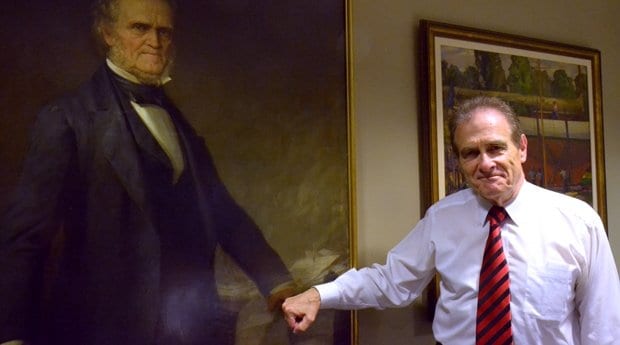Before he was a politician, Toronto Deputy Mayor Norm Kelly was a historian, a fact that becomes readily apparent if you spend more than five minutes with him.
On a Wednesday afternoon in his well-appointed office on the second floor of city hall, he’s explaining the story behind one of the many paintings that adorn the walls. It’s a large scene of a river through the mountains somewhere in Western Canada. In the foreground, two figures are fishing.
“Do you see the train?” he asks excitedly, pointing in the direction of the painting, before launching into the history of the Chinese workers who blasted the path of the new railway through the Rocky Mountains, often at the expense of their lives.
Now, just weeks away from when he steps down from a position he took during a period of political strife, Kelly is telling his own story — about how a man born into a strict religious family became an unexpected LGBT ally and a leader, of sorts, in Toronto.
At the turn of the 21st century, Kelly may have been low on the list of politicians considered friendly to LGBT causes. In 1997, he voted against dropping an appeal of a Ontario Human Rights Tribunal decision requiring same-sex spousal benefits for employees of Metro Toronto. He had never attended a Pride parade.
“I was raised in an evangelical household,” Kelly says. “[It was a] very strict interpretation of the scripture.” Politically, he had very little exposure to the LGBT community.
Even so, in 2002, he voted in support of the city requesting that then prime minister Jean Chrétien legalize same-sex marriage, signalling that Kelly was changing as the times did.
But it wasn’t until almost 10 years later, when city council stripped Mayor Rob Ford of a majority of the duties of his office and passed them to the deputy mayor, that Kelly had to consider how he would lead a diverse city.
In the 10 months since he assumed his further responsibilities, Kelly has defended the flying of the rainbow flag outside city hall during the Winter Olympics in Sochi, had the building lit up in rainbow colours for the International Day Against Homophobia and Transphobia and helped arrange the mass same-sex wedding at Casa Loma.
Kelly knows many people were surprised about the relationship that developed between him and the LGBT community in the last few months, but for him, it was a matter of fulfilling his civic duty. “[The relationship] developed out of my belief that when you are the mayor, you are the mayor of all the people,” Kelly says. “And as the deputy mayor, I felt that I had to be mayor of all the people.”
In recent years, the deputy mayor has still faced scrutiny from the LGBT community. In 2011, he told Xtra that Pride Toronto needed to be prepared to face large funding cuts during the controversy over whether Queers Against Israeli Apartheid (QuAIA) would walk in the Pride parade, noting that at the time the city was facing a deficit of $750 million. However, the motion failed, and Pride Toronto has continued to receive city funding. QuAIA also marched in the Pride parade this year.
Kelly says he could understand both sides of the issue and was very happy with the result that was reached. “In the end, I was delighted that the protesters marched in the parade and it wasn’t perceived as being disruptive or in any way detracted from the importance of it and the movement,” he says. “If that’s the case on a go-forward basis, terrific.”
At age 73, he marched in the Pride parade for the first time ever this year. “It was good fun,” he says. He invited his step-daughter-in-law to march with him — both loved the enthusiasm of the crowd. “I thought it was a statement to the world that we didn’t just tolerate diversity, that we embraced it.”
He did consider that by becoming a more vocal supporter of LGBT issues there was a chance he could alienate people in Scarborough-Agincourt, Ward 40, where he is running for reelection this year. The east-end neighbourhood of Toronto has come under scrutiny; pundits point to the suburban-urban divide as the reason for Rob Ford’s electoral success. In neighbouring Ward 38, the mayor held his controversial Ford Fest event, where several LGBT protesters faced homophobic slurs from a crowd of Ford supporters.
But Kelly says that as of yet, he hasn’t had any negative feedback from his constituents. He also quickly points out that it isn’t just people who live in Scarborough that attend Ford Fest.
At the last city council meeting this year, Kelly was recognized by his fellow councillors for guiding the administration through several challenging months. In a speech, Councillor Pam McConnell said that Kelly “brought us out of dark chaos and into the light,” a reference to the frequent controversies surrounding the mayor’s office.
One of the more recent controversies took place at the first council meeting after WorldPride — Ford made headlines when he didn’t stand with other city councillors to recognize Pride Toronto staff members. Actions like these have left people to speculate that Ford enables a segment of the population to more openly express homophobic views.
“It’s regrettable that he gives voice to it,” Kelly says. “I’ll assume he’ll pay the political price for that.” But as for recognizing city staff, he thinks that the mayor’s snub didn’t have the same impact it might once have had. “We all saw that because he had lost the leadership of council, he was acting as an individual rather than as the head of the biggest and most powerful municipal council in the land.”
Toward the end of his interview with Xtra, Kelly queries the reporter: why do we always ask if our interview subjects have anything to add, he wonders. Do we learn it in journalism school?
Like a true historian, he wants to learn something — he says learning about people has been his favourite part of being a Toronto city councillor. He has learned a lot. “Over time societies change, people change,” Kelly says. “You become more tolerant of differences of opinion and differences in lifestyle.”


 Why you can trust Xtra
Why you can trust Xtra


